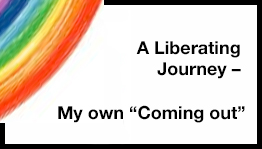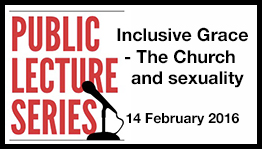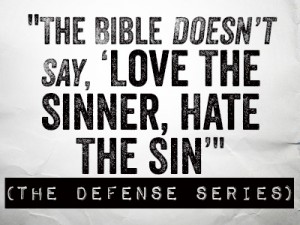Rev Len Abrams 27 April 2016
A Convenient Heresy


This is a phrase which is often used in the discussion of human sexuality and the church. I have come to the conclusion that is not only an unhelpful phrase but that it in fact masks incorrect doctrine of sin and grace. (Please note that I am not a theologian, merely someone trying to make sense of it all from day to day.)
It is not a phrase found in scripture although some verses may seem to say the same thing. I do not intend in this discussion to diminish the existence and seriousness of sin. The doctrine of sin is central to understanding the human condition, human history, grace, the incarnation and Christian doctrine as a whole.
The original phrase
The phrase originates from St. Augustine. His Letter 211 (c. 424) contains the phrase Cum dilectione hominum et odio vitiorum, which translates roughly to “With love for humankind and hatred of sins.” The phrase has become more famous as “love the sinner but hate the sin” or “hate the sin and not the sinner” (the latter form appearing in Mohandas Gandhi’s 1929 autobiography). This however is a mistranslation of Augustine’s phrase and fundamentally changes it’s meaning – the original talks of love for all whilst the latter singles out an individual sinner.
 From an inter-personal perspective the statement enables the speaker to claim a double virtue – they are claiming that they are both loving and that they are righteous in their abhorrence of sin. They are claiming thereby to be a blameless judge; having made the first statement they assume they can say the second with impunity. Having established that they are both loving and righteous, they place the unfortunate ‘sinner’ in a subjugated and judged position relative to themselves. They are speaking of the sinner as if they are in a separate spiritual or religious class from themselves. This is well illustrated by a statement I have just come across in reading around this topic – someone said:- “We are to have compassion on sinners for whom Christ died, and we are also to keep ourselves “from being polluted by the world”…..” It sounds to me like the “we” in this sentence regard themselves as different from the ‘sinners for whom Christ died’! However, there is no ‘us and them’ in the Gospel – WE ARE ALL IN THE SAME BOAT! We all have great tree-trunks in our eyes, none of us can cast the first stone, none of us are righteous apart from the blood of Jesus, we have all fallen short of God’s glory etc, etc, etc, etc.
From an inter-personal perspective the statement enables the speaker to claim a double virtue – they are claiming that they are both loving and that they are righteous in their abhorrence of sin. They are claiming thereby to be a blameless judge; having made the first statement they assume they can say the second with impunity. Having established that they are both loving and righteous, they place the unfortunate ‘sinner’ in a subjugated and judged position relative to themselves. They are speaking of the sinner as if they are in a separate spiritual or religious class from themselves. This is well illustrated by a statement I have just come across in reading around this topic – someone said:- “We are to have compassion on sinners for whom Christ died, and we are also to keep ourselves “from being polluted by the world”…..” It sounds to me like the “we” in this sentence regard themselves as different from the ‘sinners for whom Christ died’! However, there is no ‘us and them’ in the Gospel – WE ARE ALL IN THE SAME BOAT! We all have great tree-trunks in our eyes, none of us can cast the first stone, none of us are righteous apart from the blood of Jesus, we have all fallen short of God’s glory etc, etc, etc, etc.
So for me the statement “Love the sinner but not the sin” is a self righteous, thinly disguised statement of judgement whether it is applied to a serial killer on death-row or a gay person. It is a form of spiritual bullying. It is condescending in that it sets one person as superior to another. Believing in our own righteousness and judging others are to me contrary to orthodox doctrine and hence constitute heresy – the same heresy our Lord accused the Pharisees of on numerous occasions, singling it out as a key reason why the Pharisees could not perceive of the Kingdom of God – [Luke 18:9-14 and many other passages].
Divine division of labour
Jesus said that there is but one rule for us mortals which absorbs all others. When challenged, Jesus said that all the law and the prophets are summed up in the requirement to love God, to love others and to love ourselves. Crudely speaking there is a divine division of labour – the Father judges (delegated to the Son), the Son redeems, the Spirit convicts – and we are to love. It is not ours to judge; we can save no one; it is not ours to convict / convince others – ours is only to love.
I do not use the phrase “love the sinner but hate the sin” because I dare not – it is toxic to my own spirituality and it is toxic to those to whom it is said.
[In the context of human sexuality there is a further issue – the ‘sin’ referred to in “Love the sinner but hate the sin” is the sexual orientation of the person – it is not an action, it is who they are. So “love the sinner but hate the sin” is heard as “love me but hate who I am” which is contradictory, confusing and, again, unscriptural in my opinion.]
I found this link very helpful too – http://www.huffingtonpost.com/micah-j-murray/why-i-cant-say-love-the-sinner-hate-the-sin-anymore_b_4521519.html
A clarification
A clarification – I certainly believe in evil and sin (see paragraph two above). It is a daily reality in my own life and in the world. It destroys and corrupts. I believe we must challenge sin and fight injustice. Where it gets difficult is when I am engaging on a personal one-to-one level with another soul – I am doing so as a fellow traveller, irrespective of who they are, and I am no better than them. Where their behaviour may be harmful to others in such cases as abuse, criminal activity etc. I am bound to challenge that behaviour but I can only authentically do so as another traveller who has hurt those around me at times too.
